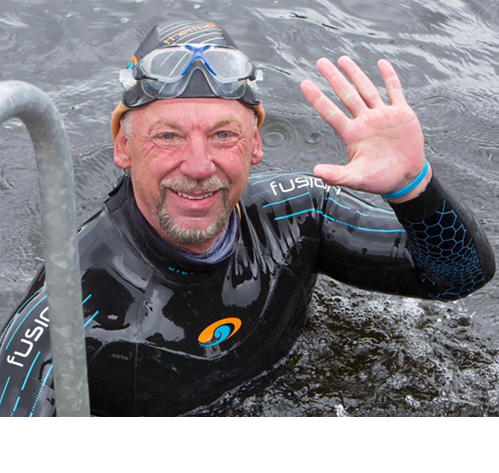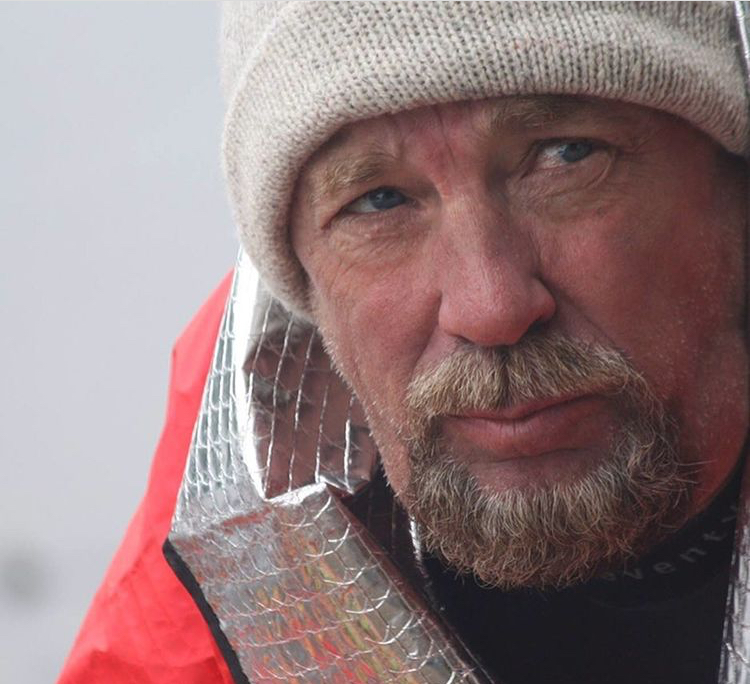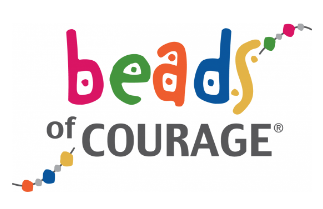Dean Hall – Adventure Swimmer, Life Coach

Note from Beads of Courage: We are honored to have Dean Hall as an Official Ambassador of the Beads of Courage Summer Challenge. You can support the Team Beads of Courage Summer Challenge through September 22. Thanks for helping Dean and all our Team BOC Summer Challengers make their miles matter more as we honor brave Beads of Courage members!
Visit the Beads of Courage Summer Challenge campaign to donate today!
Team Beads of Courage 2022 Summer Challenge Ambassador
By Loni Nannini, Beads of Courage Storyteller
Dean Hall is a King of Adventure Swimming and rivers are his kingdom.
“One of my favorite quotes is from Helen Keller, who said, ‘Life is either a daring adventure or nothing,” said Hall, 62, who became the first man to swim the length of the Willamette River in June 2014, followed by the River Shannon in 2017. This summer, he hopes to complete a trifecta with a 100-mile swim in Oregon’s Umpqua River.
As if that weren’t notoriety enough, Hall is also a cancer survivor: He accomplished the 184-mile Willamette River swim while under treatment for Chronic Lymphocytic Leukemia (CLL).
“I really thought I had very little time left and thought, ‘How cool would it be to be to go out knowing I had done something no one else in history had done while raising awareness for cancer research and maybe inspiring cancer patients not to give up just because they have received a diagnosis?’” said Hall.
Hall accomplished his goals on all fronts.
His story is one of grit, survival and adventure for the ages. It’s also a story of courage—one that every child and family involved with Beads of Courage can appreciate.
Destined for Adventure
A native Oregonian, Hall has adventure in his blood. A child of mountain-climbing and marathon-running parents, he grew up hiking, playing sports and spending “idyllic” weekends in the Cascade Mountains during the 1960s and 70s. He left the Northwest to play college soccer in Kansas where he met his first wife, Mary.
“She was a cute Kansas farm girl. I put myself in exile for love in a small town four miles from the Oklahoma border,” said Hall, who married Mary in 1980 and spent the next 30 years in Arkansas, Kansas, building a life and family that included daughter, Bre.
Earning Survivor Stripes
Life was good until Hall was diagnosed with CLL just before Christmas in 2006. He battled through chemotherapy and beat life-threatening pneumonia in 2007; 2008 and 2009 brought continued treatment and health challenges.
In 2010, everything took a terrible turn: First a severe case of food poisoning shut down Hall’s kidneys and necessitated eight days in the ICU. And then the unthinkable: Mary was diagnosed with an inoperable brain tumor and died 52 days later on October 30, just prior to the couple’s 30th wedding anniversary.
A grief expert, Hall was virtually paralyzed by the weight of his grief.
“I had given seminars on grief and when Mary died, I realized I knew nothing about it,” said Hall. Shocked and traumatized by the loss, Hall found it difficult to sleep and nearly impossible to function.
To make matters even worse, his leukemia returned with a vengeance in 2011, bringing lymphoma with it. An impromptu swim in an Oklahoma river resulted in a life-threatening scare with viral meningitis that required a six-month recovery and further ravaged Hall’s body.
Without Mary, “Kansas was just Kansas” and Hall made the decision to return to Portland. While the move brought him back to the land he loved, the decision also brought unexpected consequences.
“I had lost my wife, my adult friends and I left behind the thriving practice I had built, so I lost what most of us men errantly use for our identity—my profession. I really spiraled,” he said.
By August 2013, Hall’s 6’1”, 220-pound frame had shrunk to 159 pounds.
“The biggest thing on me were the lymph nodes that my oncologist called a ‘hockey puck’ under my right armpit. It was so big I couldn’t put my arm down,” he said.
Alone in his Portland duplex, Hall confronted a new reality.
“I had made a habit of not looking at myself for two years and when I looked in the mirror, I didn’t even recognize myself. I looked in my eyes and thought, ‘He looks so sad.’ I really thought for a moment that if I just let the leukemia take me, no one would know. Then I realized that my daughter was just starting her senior year in high school and she had lost her mom and that was an entirely selfish thought. I knew I didn’t have the luxury of that kind of thinking,” he said.
At rock bottom, Hall directed his therapy skills toward himself. Bolstered by the realization that he had helped patients recover from grief by helping them to find identities, he knew that he needed a new purpose in life. Finding one was easier said than done.
Purpose is the Question: Adventure is the Answer
In his quest for purpose, Hall tapped into research showing that the brain must answer every question asked of it.
“I had used a technique with clients in which you can ask a deep question about life and stop several times a day and focus on that, holding the question prayerfully in your mind and heart, and within days an answer will come to you. I asked myself, ‘What is my purpose? What can I be passionate about?’ Weeks later, still crickets,” he said.
One day, disgusted by the lack of an answer, he decided it was past time to start unpacking the boxes in his duplex and putting it in order.
While doing so, he came across a box of childhood memorabilia from his mom, including a journal from sixth grade.

“On the first page, I had written, ‘When I get old I have to climb Mt. Everest and swim the English Channel.’ An electric shock went through me. All I wanted to do when I was growing up was to be a sponsored adventurer. I thought immediately, ‘I can’t climb Mt. Everest since I have spent so much money on medical bills and my blood counts are so low that I can’t handle the elevation, but I can swim the English Channel,’” said Hall.
Hall called a physician friend who told him that training in a public pool for such a swim would kill him. Hall’s parents cried and begged him to reconsider.
Hall ignored them all, jumping into a pool on August 13, 2013, and pushing off the wall for the first time. It took him over an hour to swim 10 laps.
“I was embarrassed, but I was doing something. For the first time in three years, I had something to think about other than what I had lost. By Christmas, my numbers started going in the right direction, my head started to clear, I had fewer nightmares and I was doing much better,” he said.
Hall then began to question his plan: Why travel all the way to France to swim the English Channel? And how could he make the swim about something more than himself?
The answer was simple: Partner with the Leukemia & Lymphoma Society and swim the Willamette River, a vibrant blue river known as the pulse of Oregon. Hall found out that it had never been done before and knew he was destined to make history.
A Miracle in the Making
Hall started the swim on June 3, 2014 and finished on July 27, 2014, swimming 10 to 12 miles a day—the equivalent of three to four Iron Man marathons. The water was between 40 and 43 degrees each day and in spite of his wetsuit, Hall had to climb from the water every 45 minutes and do jumping jacks and other exercises on the riverbank to stave off hypothermia.
By the time he stepped out of the water on day 22, the leukemia had disappeared from his body.
“Now the thinking is that hypothermia boosts the immune system and the metabolism and changes the way the mitochondria act, boosting natural killer (NK) cells, which kill cancer cells. Swimming also gets the lymph system moving and oxygenates the body and they think that is what killed my cancer without chemo or radiation. My oncologist said that if he hadn’t diagnosed me himself, he would have thought I had been misdiagnosed. It is just miraculous,” said Hall.
Another boon from the journey was that Hall was accompanied by his dad who acted as his guide-boater, keeping him safe from log jams in the river.
“It was such a gift to share this journey with my dad. I was just looking for ways to keep living and maybe do one last courageous act to leave my daughter a legacy and all these wonderful things happened and have continued to happen since,” said Hall.
Swimming the River Shannon
Hall’s next quest was the River Shannon from Leitrim to Limerick, a 150-mile swim to benefit Ireland’s Childhood Cancer Foundation that he started on June 5, 2017 and finished on July 7.
Although some people might think it didn’t make sense to spend $12,000 to try to raise money for the foundation, Hall was adamant about the cause.
“I knew it might help my daughter to heal from the trauma surrounding my wife’s death and it might inspire some kids and their families not to give up,” said Hall, who became the first person to swim the length of the river.
He also learned about Beads of Courage and carried 250 “Act of Courage” beads on the swim, inspired by the thought of the kids and their families.
“I wrote 250 notes after I was done and that was the sweetest part of the whole thing. I wanted to write at least two sentences to each kid, and writing those notes was a gift to myself. Even though everything I had been through was hard, I was never faced with the possibility of losing my daughter, and that is just so much harder,” said Hall, who believes that the idea behind Beads of Courage is genius.
“As a therapist, I can see that Jean Gribbon has come up with a way to give kids a voice: The idea of helping to process trauma with beads is brilliant,” he said.
Navigating the Next Challenge: The Umpqua River
As Hall tackles the 100-mile Umpqua River swim, which he hopes to complete on or around June 24, 2022, he has a new purpose. He has taken on the role of a 2022 Beads of Courage Summer Challenge Ambassador and hopes to help Beads of Courage raise $30,000 by the end of summer.
Supported in his mission by Bre and his wife, Bobbi Parker Hall
(Instagram @modernbodiesfitness), along with extended family and friends, Hall recognizes the significance of carrying beads for 100 miles of walking, hiking, biking, swimming or any other activity. He encourages both beginners and experienced athletes—and those with physical or health limitations—to consider the deeper meaning behind joining the Challenge with an activity of their choice.
“Anyone with the right mindset can swim 100 miles or walk, run or bike 100 miles. I do it to give hope and I can’t think of anyone I would rather give hope to than sick kids and their parents,” said Hall. You can read more about him at swimminginmiracles.com and instagram.com/deanhallofficial.
A Methodology for Miracles: Inspiring Others to Pursue Their Goals
While training for adventure swims and other fitness goals, Hall recognizes that there are many methodologies, from singing to oneself to running favorite movies from start to finish in your mind.
His has found an approach that works well for him:
- Meditate and be present in the moment.
“I have practiced mindful meditation every day since October 2000, and that is the closest to how I feel when I swim. I feel the cold and the bumps and watch the ripples and bubbles and see the green on the banks, and I feel almost giddy to be alive.
Remember that strife builds strength.
• Remember: Even if your body has been compromised, you are likely capable of more than you think.
“My body has been through so much on my cancer journey that it has given the strength to endure. When you lose a wife and you have so many health challenges and battles and unexpected terrible things happen, then being really tired or really sore is not a big deal. It is not life-threatening. It is survivor’s strength.”
• Mindset over matter.
“No one forces me to do this. I do it because I want to do it and I tell people that mindset affects everything. We are virtually limitless. This is not just a bumper sticker slogan: I want my actions to speak louder than words and prove that what I am saying is true.”
• Time is limited, so make the most of it.
Hall learned firsthand that the mistaken idea that time is unlimited can rob people of full and beautiful lives. He said that he and Mary were married long before Bucket Lists, but they had compiled a “Have To” list of 20 items. When she died at age 52, they had only checked two items off the list.
“We were busy and working hard and saving and trying to do everything that people are taught to do, and we thought we had unlimited time. Now one of my favorite quotes is by Leonard Bernstein: ‘To achieve great things, two things are needed: A plan and not quite enough time.’ I always act like I don’t have quite enough time.”
• Find all the fun all the time.
“If you are having fun, you are more optimistic, more grateful, more able to think and more able to access your potential and strength. At the start of every morning, I ask myself one question: ‘How can I do that and have more fun?’ That puts me in a position of power and playfulness that makes my potential more readily available.”
